- Home
- Ralph Ellison
Juneteenth
Juneteenth Read online
Praise for RALPH ELLISON’s
Juneteenth
“Juneteenth is written with unmistakable Ellisonian zest, depth, and elegance.… The work holds together as a complete, aesthetically satisfying, and at times thrilling whole.”
—The Atlantic Monthly
“Ralph Ellison’s generosity, humor and nimble language are, of course, on display in Juneteenth, but it is his vigorous intellect that rules the novel. A majestic narrative concept.”
—Toni Morrison
“[F]irst-rate Ellison, exploring race and America in dreamlike prose.”
—The Wall Street Journal
“A stunning achievement.… Juneteenth is a tour de force of untutored eloquence. Ellison sought no less than to create a Book of Blackness, a literary composition of the tradition at its most sublime and fundamental.”
—Henry Louis Gates, Jr., Time
“Ellison’s writerly skills are awesome. He enables us to relive the astonishment of the first generation to experience the movies and reanimates the commonplace pleasures of a type of boyhood that may never come again. He recaptures the heated fervor of the revival tent so vividly that you feel yourself begin to sweat.”
—Houston Chronicle
“Impressionistic, jazzy, and Faulknerian, assembled from stories inside of stories, dreams, flights of memory, and bolts of rhetoric.”
—New York
“For anyone who cares about American literature and the seemingly insolvable pain of race, Juneteenth is a must-read.”
—USA Today
“Juneteenth contains the most resonant and alluring uses of the American idiom I’ve read in a while.… It rolls and riffs. Get down to the bookstore and open it and read, brothers and sisters, read.”
—D. T. Max, The New York Observer
“Ellison wrote better sentences than just about anybody.… Juneteenth is good the first time, better the second. His meanings slip and slide, they are associative, like American culture, where nothing is ever quite what it seems, nor stays that way for long, and where absolutely nothing is purely black and white.”
—Newsweek
“Juneteenth is a cause for celebration.”
—The Christian Science Monitor
“More than anything, Ellison was a passionate writer, and passion is unquestionably present in Juneteenth.”
—The Boston Globe
“Ellison may be the greatest of jazz sermonizers and homiletic blues guitarists ever to write fiction.”
—The Nation
“A riotous revel in what H. L. Mencken called The American Language, which Ralph Ellison has taken to his beloved Territory and back again.”
—Mirabella
“A uniquely American drama of independence and codependency set in a world of conspicuous racial fractures and invisible solidarities.”
—Boston Review of Books
“A work so long in process that it assumed legendary status decades ago, the successor to Ralph Ellison’s Invisible Man appears at last.… It is a work of rare and doubtless unique intelligence, purpose, and power—a generous legacy bequeathed to us, persuasive testimony to the genius of Ralph Ellison.”
—Kirkus Reviews
“Juneteenth may be one of the most important books of the year, if not the decade.… An eloquent, intelligent, and worthwhile statement on race relations in the country during the twentieth century.”
—The Tampa Tribune-Times
“Ellison stands as one of the exemplary writers of the century.… This painstakingly assembled edition keeps his genius visible.”
—Fort Worth Star-Telegram
“Demanding, dense, and undeniably brilliant.”
—Rocky Mountain News
“On display throughout the novel are Ellison’s wit, his marvelous ear for language, and his sublime intellectual approach to the visceral issues eating at America’s heart.”
—The Star-Ledger
“The fun of reading this book—and there is some fun on every page—comes from Ellison’s familiarity with African-American folklore and literature.”
—San Jose Mercury News
“Ellison’s signature preoccupations with language and the racial markings of American Identity stream through a beautifully written tale.”
—The San Diego Union-Tribune
“Ellison, both as a prose writer and literary thinker, was and is an American master.”
—The Denver Post
“Ellison’s long-delayed second novel is a fitting testament to his talent.”
—The Dallas Morning News
“Thanks to the astute and dedicated editing of John Callahan, we have a book that can fairly be called Ralph Ellison’s second masterpiece. Juneteenth is, quite simply, a great American novel.”
—The Oregonian
ALSO BY RALPH ELLISON
Invisible Man
Shadow and Act
Going to the Territory
The Collected Essays of Ralph Ellison
Flying Home and Other Stories
RALPH ELLISON
Juneteenth
Ralph Ellison was born in Oklahoma City in 1914. He is the author of the novel Invisible Man (1952), winner of the National Book Award and one of the most important and influential American novels of the twentieth century, as well as numerous essays and short stories. He died in New York City in 1994.
John F. Callahan is Morgan S. Odell Professor of Humanities at Lewis and Clark College in Portland, Oregon. He is the editor of the Modern Library edition of The Collected Essays of Ralph Ellison and is literary executor of Ralph Ellison’s estate.
Charles Johnson, the S. Wilson and Grace M. Pollock Endowed Professor of Writing at the University of Washington, received the 1990 National Book Award for his novel Middle Passage.
FIRST VINTAGE INTERNATIONAL EDITION, JUNE 2000
Copyright © 1999 by Fanny Ellison
Introduction and Afterword copyright © 1999 by John Callahan
Preface copyright © 2000 by Charles Johnson
All rights reserved under International and Pan-American Copyright Conventions.
Published in the United States by Vintage Books, a division of Random House, Inc., New York, and simultaneously in Canada by Random House of Canada Limited, Toronto.
Originally published in slightly different form in hardcover in the United States by Random House, Inc., New York, in 1999.
Vintage is a registered trademark and Vintage International and colophon are trademarks of Random House, Inc.
Portions of Juneteenth were previously published in different form in The New Yorker, The Noble Savage, and The Quarterly Review of Literature.
Grateful acknowledgment is made to the following for permission to reprint previously published material:
Harcourt Brace & Company and Faber and Faber Limited: Excerpt from Section III of “Little Gidding” from Four Quartets by T. S. Eliot. Copyright © 1942 by T. S. Eliot and copyright renewed 1970 by Esme Valerie Eliot. Rights throughout the world excluding the United States are controlled by Faber and Faber Limited. Reprinted by permission of Harcourt Brace & Company and Faber and Faber Limited.
Liveright Publishing Corporation: “The Hurricane” from Complete Poems of Hart Crane, edited by Marc Simon. Copyright © 1933, 1958, 1966 by Liveright Publishing
Corporation. Copyright © 1986 by Marc Simon. Reprinted by permission of Liveright Publishing Corporation.
The Library of Congress has cataloged the Random House edition as follows:
Ellison, Ralph.
Juneteenth : a novel / by Ralph Ellison; edited by John F. Callahan.
p. cm.
1. Afro-Americans—Fiction. I. Callahan, John F., 1940– . II. Title.
PS3555.L625J86 1999
813′.54—dc21 98-44868
eISBN: 978-0-307-79736-0
www.vintagebooks.com
v3.1
To That Vanished Tribe into Which I Was Born:
The American Negroes
This is the use of memory:
For liberation—not less of love but expanding
Of love beyond desire, and so liberation
From the future as well as the past. Thus, love of a country
Begins as attachment to our own field of action
And comes to find that action of little importance
Though never indifferent. History may be servitude,
History may be freedom. See, now they vanish,
The faces and places, with the self which, as it could, loved them,
To become renewed, transfigured, in another pattern.
T. S. Eliot, “Little Gidding”
CONTENTS
Cover
Other Books by This Author
About the Author
Title Page
Copyright
Dedication
Preface
Introduction
Chapter 1
Chapter 2
Chapter 3
Chapter 4
Chapter 5
Chapter 6
Chapter 7
Chapter 8
Chapter 9
Chapter 10
Chapter 11
Chapter 12
Chapter 13
Chapter 14
Chapter 15
Chapter 16
Notes
Afterword: A Note to Scholars
PREFACE
Despite his death on April 16, 1994, we are by no means finished with Ralph Ellison’s literary legacy, especially after the publication of his many-splendored second novel, Juneteenth, which guarantees that we will be discussing Ellison’s contribution to American letters well into the next millennium.
And as an increasingly multi-racial society, we are indebted, of course, to John Callahan for conjuring this portion of Ellison’s magnum opus from over two thousand pages revised and rewritten over a period of forty-two years. Everywhere in Juneteenth Ellison’s decades-long distillation of craftsmanship and originality of thought are evident. His dedication for this ambitious work (“To That Vanished Tribe into Which I Was Born: The American Negroes”) signals his project of honoring and exploring the lives of black Americans who, from the nation’s founding to the 1950s, and despite the burden of racial oppression, embodied our Republic’s loftiest ideals.
In Juneteenth that Vanished Tribe is represented by the Reverend Alonzo Hickman, a former black jazz musician turned revivalist preacher, who raises a white boy named Bliss in the hope that he will recognize the complexity of the American experience and “speak for our condition from inside the only acceptable mask. That he would embody our spirit in the council of our enemies.” But Bliss turns his back on the black culture that nurtured him, transforming first into a filmmaker, then into a race-baiting senator named Adam Sunraider (“the most vehement enemy of their people in either house of Congress”) who is shot by a black assassin on the Senate floor.
Unraveling the mystery of Bliss’s odyssey from child preacher to con-man to racist politician, and of his own failure, becomes Reverend Hickman’s obsession as he keeps a vigil by mortally wounded Sunraider’s deathbed. Unlike Ellison’s masterpiece, Invisible Man, a barn-burning bildungsroman that explodes forward from one chapter to the next, Juneteenth spirals downward ever deeper through layers of memory, history, philosophical reflection, and culture—and in doing so it delivers the most dazzling, breathtakingly seductive writing we have witnessed since Ellison’s first novel in 1952.
Here, in dozens of fully imagined, deeply felt passages refined and polished to the level of poetry, readers will find—as in Invisible Man—an exuberant, democratic fusion of fictional styles and American voices and vernaculars; symphonically rendered scenes of Southern revivals that celebrate “Juneteenth,” the day (June 19, 1865) that Union troops entered Texas; an astonishingly beautiful tribute to Abraham Lincoln, offered with the acuity that only a member of the Vanished Tribe could write because it reveals our fourteenth president to be “one of us, not only because he freed us to the extent that he did, but because he freed himself of that awful inherited pride they deny us”; and Ellison’s characteristic humor and irony, his delicious wordplay and punning, as he broods deeply on philosophical questions such as reality vs. illusion, blindness vs. true seeing, and the fact that our lives are already more integrated than we usually dare to acknowledge (“There’s always the mystery,” he writes, “of the one in the many and many in the one, the you in them and the them in you—ha!”).
In a word, Juneteenth is the long-awaited work we have needed for decades to refine our discourse on race, just as for nearly half a century we needed the singular voice and humanistic vision of Ralph Waldo Ellison to remind us, as he does in this capacious, second novel, that “Man at his best, when he’s set in all the muck and confusion of life and continues to struggle for his ideals, is near sublime …”
Charles Johnson
December 1999
INTRODUCTION
In his later years, after hours, if he had put in a good day at his desk, Ralph Ellison was known to chuckle at the parallel between the “crazy country” he loved and contended with and what in 1969 he called his “novel-in-progress (very long in progress).” Ellison’s projected second novel was a glint in his eye as early as June of 1951, when he wrote Albert Murray that he was “trying to get going on my next book before this one [Invisible Man] is finished …” In April 1953 he told Murray of his “plan to scout the Southwest. I’ve got to get real mad again, and talk with the old folks a bit. I’ve got one Okla. book in me I do believe.” By 1954 Ellison had begun to put pen to paper, and in April of 1955 he sent Murray a “working draft” of an episode. From then on, even as he wrote numerous essays, taught at half a dozen colleges, held the Albert Schweitzer Professorship in the Humanities at New York University, and, in the name of citizenship, did more than his duty on national boards and commissions, the second novel remained Ellison’s hound of heaven (and hell) pursuing him “down the arches of the years,” pursuing him “down the labyrinthine ways / Of [his] own mind” until the end of his life in 1994.
From 1955 to 1957 Ellison was at work on the second novel as a fellow at the American Academy in Rome. “It was in Rome during 1956,” he told John Hersey, that he “conceived the basic situation, which had to do with a political assassination.” Not too long afterward, in June of 1959, Ellison wrote Murray that “Bellow [with whom Ellison was sharing a house in Tivoli, New York, close to Bard College, where both men taught] has read book two and is to publish about fifty pages in a new mag which he is editing—THE NOBLE SAVAGE—of all things.” Telling David Remnick of The New Yorker in 1994 that Ellison had “let me read a considerable portion of it—a couple of hundred pages, at least,” Bellow remembered vividly that “all of it was marvelous stuff, easily on a level with Invisible Man.” In a later reminiscence Bellow wrote, “In what he did, Ralph had no rivals. What he did no one else could do—a glorious piece of good fortune for a writer.”
During the next five or six years Ellison published three more excerpts in literary quarterlies. Meanwhile, the contract for the book, dated August 17, 1965, stipulated delivery on September 1, 1967. In his own mind Ellison was moving toward completion in the summer and fall of 1967 as he revised the novel at his summer home outside Plainfield, a village in the Berkshires. Then, in the late afternoon of November 29, 1967, Ellison and his wife, Fanny, returned from shopping to find the house in flames. With regret in her voice, Mrs. Ellison recalled being restrained from approaching the burning house by volunteer firemen who had arrived too late. “I wish I’d been able to break the window and pull out Ralph’s manuscript,” she told me years later. “I knew right where it was.”
The Plainfield fire has taken on the proportions of
myth to such an extent that it is useful to revisit what Ellison had to say about it over the years. Ten days after the event, he wrote Charles Valentine that “the loss was particularly severe for me, as a section of my work-in-progress was destroyed with it.” Later in the same letter Ellison outlined the task he saw before him: “Fortunately, much of my summer’s work on the new novel is still in my mind and if my imagination can feed it I’ll be all right, but I must work quickly.” According to James Alan McPherson, Ellison told him in 1969 that the fire “destroyed a year’s worth of revisions,” but that “he is presently in the process of revising it again.” In 1980 Ellison told a reporter from the Daily Hampshire Gazette, “I guess I’ve been able to put most of it back together.” To David Remnick, just before his eightieth birthday in 1994, Ellison made perhaps his fullest public comment on the fire: “There was, of course, a traumatic event involved with the book. We lost a summer house and, with it, a good part of the novel. It wasn’t the entire manuscript, but it was over three hundred and sixty pages. There was no copy.”
By the time of McPherson’s account, done with Ellison’s blessing and collaboration in 1970, the second novel had begun to loom larger than a novel or a work-in-progress. “He has enough typed manuscripts to publish three novels,” McPherson wrote, “but is worried over how the work will hold up as a total structure. He does not want to publish three separate books, but then he does not want to compromise on anything essential. ‘If I find that it is better to make it a three-section book, to issue it in three volumes, I would do that as long as I thought that each volume had a compelling interest in itself,’ ” Ellison told McPherson. On and off for the rest of his life, Ellison continued to work on his mythic saga of race and identity, language and kinship in the American experience. Sometimes revising, sometimes reconceiving, sometimes writing entirely new passages into an oft-reworked scene, he accumulated some two thousand pages of typescripts and printouts by the time of his death. His last published excerpt from the novel, an offshoot from the main text titled “Backwacking: A Plea to the Senator,” appeared in 1977. Although he continued to write and revise until a fatal illness struck him at the end of March 1994, just four weeks after his eightieth birthday, Ralph Ellison did not live to finish his forty-year work-in-progress.

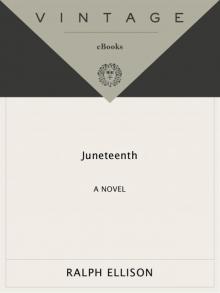 Juneteenth
Juneteenth Invisible Man
Invisible Man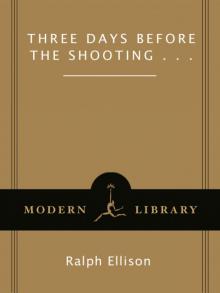 Three Days Before the Shooting . . .
Three Days Before the Shooting . . . Flying Home and Other Stories
Flying Home and Other Stories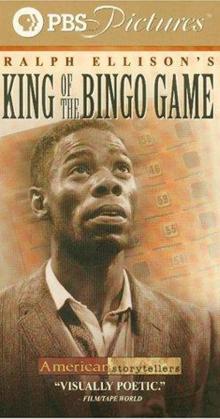 King of the Bingo Game
King of the Bingo Game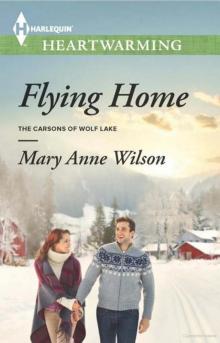 Flying Home
Flying Home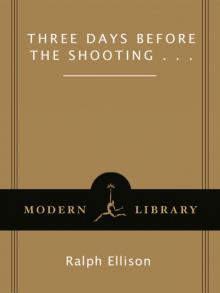 Three Days Before the Shooting ...
Three Days Before the Shooting ...